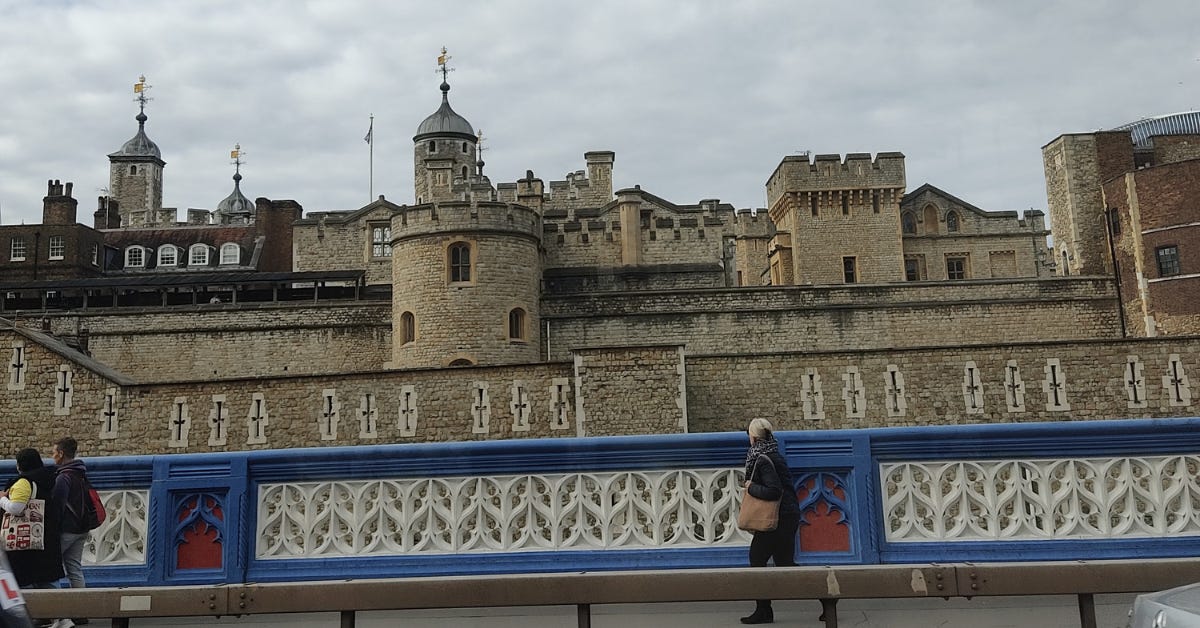Last month was In Formation’s biggest ever in terms of growth. I’m grateful to you all for reading, sharing, subscribing, encouraging, etc.
If you’re new, welcome! I hope this is helpful, and I’d love to hear your thoughts.
“The view of London from Waterloo bridge is of a mess — an eccentric, unplanned, maddening, exhilarating mess.”1
London wasn’t always a mess. It was once Londinium.
The capital of Roman Britain was arranged as a rectangular grid, assembled around the centrepiece of the five-acre forum and basilica, the remains of which can be visited beneath Leadenhall Market (halfway between St Paul’s Cathedral and the Tower of London). At the back of a modern-day barbershop lies a small section of Roman wall — an enduring embodiment of the way the city gradually engulfed the ancient ruins.
As the empire faded, London was largely abandoned for centuries, later to be revitalised by the Saxons then the Normans (who left us Westminster Abbey and the Tower of London), eventually becoming the thriving metropolis it is today.

The whole episode is a vivid analogy for the state of the modern Western world.
For millennia, for better and worse, the story of the West has been intertwined with the Christian story.2 But the two now seem to be on diverging paths, with Christianity exploding in the Global South and traditionally Christian countries more bashful than ever about their histories. Church attendance, biblical literacy and fondness for religious institutions have plummeted in countries like the UK, the USA, and Australia.3
As the Christian story is increasingly rejected as an existential narrative, many find themselves profoundly storyless — a catastrophe given that the story a person inhabits is utterly fundamental to their experience of the world. Measures of mental and spiritual disorder have skyrocketed, especially among young people, as we wander a sort of existential wilderness, having left the well-trodden path behind.4 No wonder we turn for comfort and purpose to politics, spirituality, psychologists, technology, psychedelics, anti-depressants, cosmetics, self-help gurus and (fill in your personal relief).
The ancient home of the West, having withstood the storms of millennia, has finally been ruined — not (in my estimation) proven inadequate or outmatched, but taken apart from the inside over centuries, one brick at a time.5

Renovating the World
Everyone needs a home. So we scramble to erect shelter where a towering cathedral once stood. Like the Saxons in London, the heirs of this Christian heritage are happy to leave some of the old walls standing. Like the Normans, they happily reuse many of the bricks.
Most atheists in the West (I’m referring to materialist secular humanists), for example, affirm that humans are extremely special: equipped with a mystical consciousness; possessive of inherent and equal dignity and value; worthy of compassion and protection; able and responsible to create meaning and beauty; accountable for the stewardship of the world.
But what is it (we might ask Dawkins, Hitchens, Grayling or Pinker) that makes these short-lived, tribally-quarrelsome, biologically-predetermined collections of physical matter so special? As Glen Scrivener would say, how do you get the fruits of Christianity without the roots?
It can’t be that humans possess an immaterial and indestructible soul, or that they are made in the image of the divine, because the materialist has ruled these out. Nor will it do to say that we “hold these truths to be self-evident” — partly because of the way that sentence continues6 and partly because these truths have so clearly not been self-evident apart from the soil of the Christian tradition.7
So is there a compelling way to explain the mystery of consciousness and justify this lofty view of humanity in purely naturalistic terms? Maybe. But I haven’t heard it. And I have been listening attentively.
Go Hard or Go Home
That is precisely the claim of the materialist. Everything is physical; nothing is super-natural; any appearance of transcendence or immateriality is ultimately an illusion. But on closer inspection, I've found that many are tempted to mix together an unnatural concoction of materialist physics and Christian metaphysics, while embracing the whole of neither. The point is that if someone is a naturalist in a debate, a Reddit forum and a philosopher paper, then they must maintain their rejection of the supernatural at a funeral, in a relationship and in an existential crisis — or else cease to be a naturalist altogether.
The Christian story more or less claims to explain everything. Science itself claims nothing of the sort, but many who hold to a full-on Scientism make that claim on science’s behalf, so that the two are often presented as rivals in the intellectual and spiritual battleground of the modern West.
Honestly, I find atheism most convincing when its proponents go hard. I respect the idea of looking around at the rubble and saying “this is all meaningless” — not because it’s pessimistic, but because it demonstrates intellectual integrity. But then, as I write this, I realise this isn’t true of a single atheist who comes to mind8, despite it seeming to me like a straightforward implication of the worldview. (If you disagree, I’d love to hear your perspective.)
I find Christians most convincing when they go hard too. The faith is least attractive to me when it’s diluted with nationalism or capitalism or post-modernism or Gnosticism or the like. Jesus warned repeatedly that those who would follow him must first count the cost, lest they lay a foundation and find themselves unable to finish building. Discipleship is a whole-life endeavour.
So whatever story you inhabit, let it be, as a matter of both intellectual integration and personal integrity, one story. If you are an atheist, live as an atheist. If you are an agnostic, live as an agnostic. (But definitely don’t get comfortable — more on that soon.) If you are a Christian, live as a Christian. As Jesus’ brother recognised, the one who lives a sort of schizophrenic, ‘double-minded’ mental life is “like a wave of the sea, blown and tossed by the wind … unstable in all they do.”9
Our culture no longer flinches at inconsistency and internal contradiction10, but we all know deep down that there is nothing more important than honestly pursuing truth and living with integrity when we think we’ve found it. So here’s the point: do your answers to the big questions of life fit neatly together? Do you believe in atheism plus souls, or agnosticism plus heaven? Do you believe in theism minus accountability or Christianity minus miracles? How are you going at living out one coherent story?
Does the life you live match The Story you believe is true?
Simon Jenkins, A Short History of London, p.1
I’ll leave the argument for this symbiotic history to authoritative Christians like Glen Scrivener or authoritative non-Christians like Tom Holland, Douglas Murray, Jordan Peterson, Yuval Noah Harari, John Gray, Niall Ferguson and even Joe Rogan (less authoritative and more surprising).
It is important to note that those who represent the Christian story sometimes represent it very poorly (by poorly, I mean both immorally and inaccurately).
For a treatment of the highs and lows of Christian history (which ought properly to be distinguished from its theological essence), see John Dickson’s Bullies and Saints. I haven’t read it, but I hear from trustworthy people that it’s great, and I know enough of John’s work to recommend it anyway.
If this interests you, check out Graphs about Religion by Ryan Burge. I don’t know him, but his Substack is interesting and sometimes surprising.
This tsunami of misery among young people is due also to our incapacity to live in harmony with the technology available to us. But surely it is (to some extent at least) our jettisoning of the transcendent which has left us unable to relate to the imminent with the appropriate wisdom and care.
Both the West and the church ought to acknowledge this process and look inward.
“…that all men are created equal, that they are endowed by their Creator with certain unalienable Rights…” (United States Declaration of Independence; emphasis mine)
Consider, for example: the Spartans, Greeks, Romans, and everyone else in the world of classical antiquity; participants in the Roman, Arab, Ottoman, Viking, and Transatlantic slave trades; Nazi Germany, Soviet Russia and Maoist China; contemporary instances of authoritarianism, human trafficking and slavery; and mildly influential thinkers like Plato and Aristotle, Thomas Hobbes, Marquis de Sade, Friedrich Nietzsche, Ayn Rand, Michel Foucault, and Peter Singer.
Maybe just because people whose outlook is so bleak don’t sell as many books.
The Letter of James, chapter 1, verses 6-8
I’m alluding to cultural movements like post-modernism and meta-modernism, not any particular political controversies.






The Experience of God by David Bentley Hart is excellent.
Go hard or go home. Too many christians are also wandering around an existential wilderness of personal peace and integration of post-modern beliefs into their Christian worldview. Christians in the Global South are going hard because they know the alternative is a wasteland.